新视野大学英语3课文1-6单元sectionB原文
新视野大学英语第三版第三册第一单元SectionB(含全部课后练习答案)_2022年学习资料

Background information-2.What is special educat on?-Tips-Special e-education refers to-educatio al-services-disabled students and students-who ave difficulty learning at-the usual rate.
Section B-Chance favors the prepared-Contents-W rming-up-Reading skills-Text study-Comparative tudy-UCCE-Unit project
Background information-1.Who is Les Brown?-Tips 2.What is special education?-3.What is a DJ?
Presentation of the skill-Denotation and Connot tion-Example 1-Thankfully,he did finish at Harr w and his-errors there did not preclude him fro going-on to the university.He eventually had a premier army career whereby he was later-electe prime minister.Text A,Para.1-Denotation:fortun tely-Connotation:-The-word-thankfully-associate with a feeling of relief and-pleasure,indicati g the-author's positive-attitude toward Churchi l.-To be continued
新视野大学英语读写教程【第三版】第三册课文原文与翻译
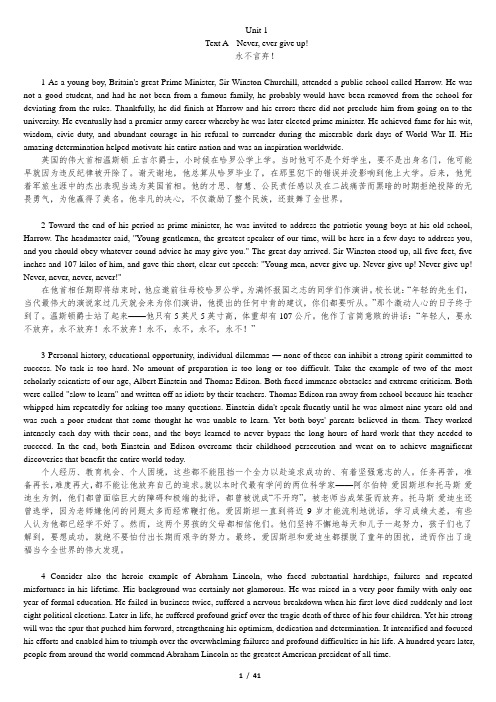
Unit 1Text A Never, ever give up!永不言弃!1 As a young boy, Britain's great Prime Minister, Sir Winston Churchill, attended a public school called Harrow. He was not a good student, and had he not been from a famous family, he probably would have been removed from the school for deviating from the rules. Thankfully, he did finish at Harrow and his errors there did not preclude him from going on to the university. He eventually had a premier army career whereby he was later elected prime minister. He achieved fame for his wit, wisdom, civic duty, and abundant courage in his refusal to surrender during the miserable dark days of World War II. His amazing determination helped motivate his entire nation and was an inspiration worldwide.英国的伟大首相温斯顿·丘吉尔爵士,小时候在哈罗公学上学。
当时他可不是个好学生,要不是出身名门,他可能早就因为违反纪律被开除了。
谢天谢地,他总算从哈罗毕业了,在那里犯下的错误并没影响到他上大学。
新视野大学英语第三册课文原文加翻译
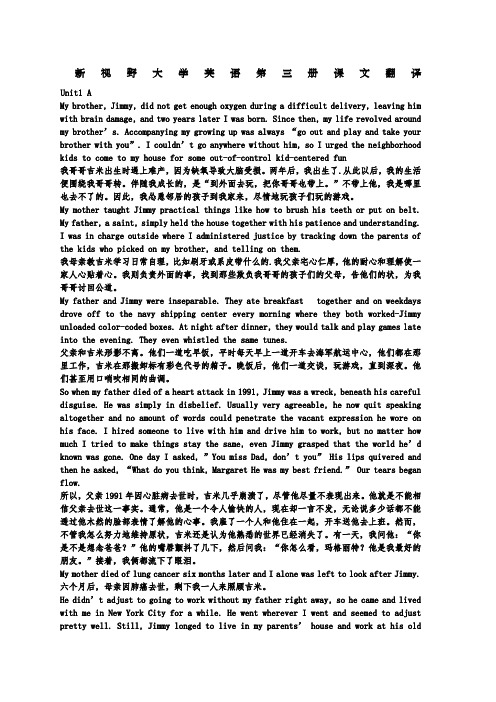
新视野大学英语第三册课文翻译Unit1 AMy brother, Jimmy, did not get enough oxygen during a difficult delivery, leaving him with brain damage, and two years later I was born. Since then, my life revolved around my brother’s. Accompanying my growing up was always “go out and play and take your brother with you”. I couldn’t go anywhere without him, so I urged the neighborhood kids to come to my house for some out-of-control kid-centered fun我哥哥吉米出生时遇上难产,因为缺氧导致大脑受损。
两年后,我出生了.从此以后,我的生活便围绕我哥哥转。
伴随我成长的,是“到外面去玩,把你哥哥也带上。
”不带上他,我是哪里也去不了的。
因此,我怂恿邻居的孩子到我家来,尽情地玩孩子们玩的游戏。
My mother taught Jimmy practical things like how to brush his teeth or put on belt. My father, a saint, simply held the house together with his patience and understanding.I was in charge outside where I administered justice by tracking down the parents of the kids who picked on my brother, and telling on them.我母亲教吉米学习日常自理,比如刷牙或系皮带什么的.我父亲宅心仁厚,他的耐心和理解使一家人心贴着心。
新视野大学英语第三册sectionB原文翻译
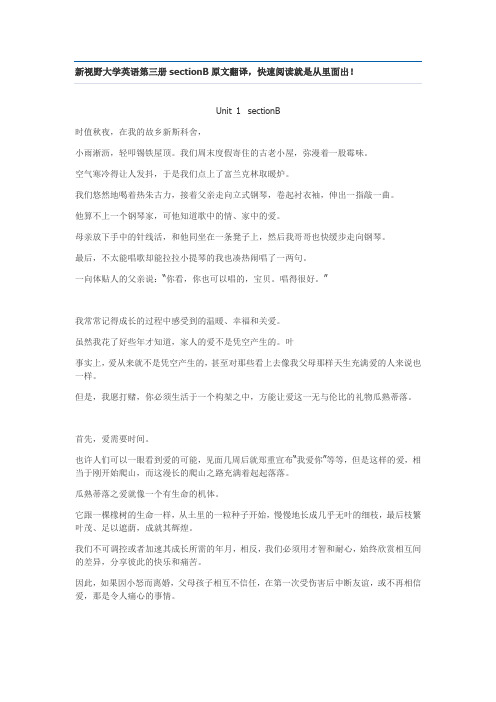
新视野大学英语第三册sectionB原文翻译,快速阅读就是从里面出!Unit 1 sectionB时值秋夜,在我的故乡新斯科舍,小雨淅沥,轻叩锡铁屋顶。
我们周末度假寄住的古老小屋,弥漫着一股霉味。
空气寒冷得让人发抖,于是我们点上了富兰克林取暖炉。
我们悠然地喝着热朱古力,接着父亲走向立式钢琴,卷起衬衣袖,伸出一指敲一曲。
他算不上一个钢琴家,可他知道歌中的情、家中的爱。
母亲放下手中的针线活,和他同坐在一条凳子上,然后我哥哥也快缓步走向钢琴。
最后,不太能唱歌却能拉拉小提琴的我也凑热闹唱了一两句。
一向体贴人的父亲说:“你看,你也可以唱的,宝贝。
唱得很好。
”我常常记得成长的过程中感受到的温暖、幸福和关爱。
虽然我花了好些年才知道,家人的爱不是凭空产生的。
叶事实上,爱从来就不是凭空产生的,甚至对那些看上去像我父母那样天生充满爱的人来说也一样。
但是,我愿打赌,你必须生活于一个构架之中,方能让爱这一无与伦比的礼物瓜熟蒂落。
首先,爱需要时间。
也许人们可以一眼看到爱的可能,见面几周后就郑重宣布“我爱你”等等,但是这样的爱,相当于刚开始爬山,而这漫长的爬山之路充满着起起落落。
瓜熟蒂落之爱就像一个有生命的机体。
它跟一棵橡树的生命一样,从土里的一粒种子开始,慢慢地长成几乎无叶的细枝,最后枝繁叶茂、足以遮荫,成就其辉煌。
我们不可调控或者加速其成长所需的年月,相反,我们必须用才智和耐心,始终欣赏相互间的差异,分享彼此的快乐和痛苦。
因此,如果因小怒而离婚,父母孩子相互不信任,在第一次受伤害后中断友谊,或不再相信爱,那是令人痛心的事情。
我们常常未经深思熟虑就向某人说“再见”,结果付出了非常昂贵的感情代价。
我曾经认识一对父子,他们被各自的生活困难困扰,多年来距离越拉越远,结果相互间几乎没话可说,而相互间没了依靠,他们的生活变得空虚。
儿子大学毕业后的那个夏天,打算开着黄色老卡车到连通全国的双车道公路上周游一番(那时还没有免费高速公路)。
新视野大学英语(第三版)读写教程Book1-Unit6 Section B-Earn as you learn

Inspiring your thoughts
Step 3 Think about how signal words help us in reading.
Signal words are like traffic lights or road signs. They give hints about what is going to happen, warn you of changes in direction so that you can follow the author’s sequence of ideas more readily, and therefore improve your reading comprehension. Signal words can be used to show relations between sentence parts, between sentences, or even between paragraphs.
Lead-in
Task
Talking about the effects of part-time jobs
Do you believe in the findings and explanations in Text A? Use one experience of a person you know who has taken part-time jobs to support your idea.
Lead-in
I don’t believe in the results of the report. One of my friends has worked 20-plus hours a week in a real-estate finance company while studying economics in college. He had to work for his cost of food and entertainment. Ultimately, the working experience gave him an edge over his peers after leaving college. He even saved up enough money during college to start his own education business.
新视野大学英语第三版读写教程第三册UNIT6课文及翻译(A+B篇)
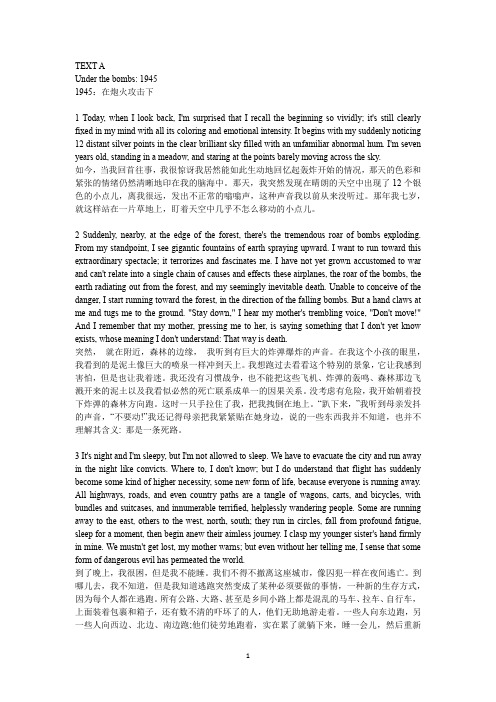
TEXT AUnder the bombs: 19451945:在炮火攻击下1 Today, when I look back, I'm surprised that I recall the beginning so vividly; it's still clearly fixed in my mind with all its coloring and emotional intensity. It begins with my suddenly noticing 12 distant silver points in the clear brilliant sky filled with an unfamiliar abnormal hum. I'm seven years old, standing in a meadow, and staring at the points barely moving across the sky.如今,当我回首往事,我很惊讶我居然能如此生动地回忆起轰炸开始的情况,那天的色彩和紧张的情绪仍然清晰地印在我的脑海中。
那天,我突然发现在晴朗的天空中出现了12个银色的小点儿,离我很远,发出不正常的嗡嗡声,这种声音我以前从来没听过。
那年我七岁,就这样站在一片草地上,盯着天空中几乎不怎么移动的小点儿。
2 Suddenly, nearby, at the edge of the forest, there's the tremendous roar of bombs exploding. From my standpoint, I see gigantic fountains of earth spraying upward. I want to run toward this extraordinary spectacle; it terrorizes and fascinates me. I have not yet grown accustomed to war and can't relate into a single chain of causes and effects these airplanes, the roar of the bombs, the earth radiating out from the forest, and my seemingly inevitable death. Unable to conceive of the danger, I start running toward the forest, in the direction of the falling bombs. But a hand claws at me and tugs me to the ground. "Stay down," I hear my mother's trembling voice, "Don't move!" And I remember that my mother, pressing me to her, is saying something that I don't yet know exists, whose meaning I don't understand: That way is death.突然,就在附近,森林的边缘,我听到有巨大的炸弹爆炸的声音。
新视野大学英语第三版第三册课文翻译
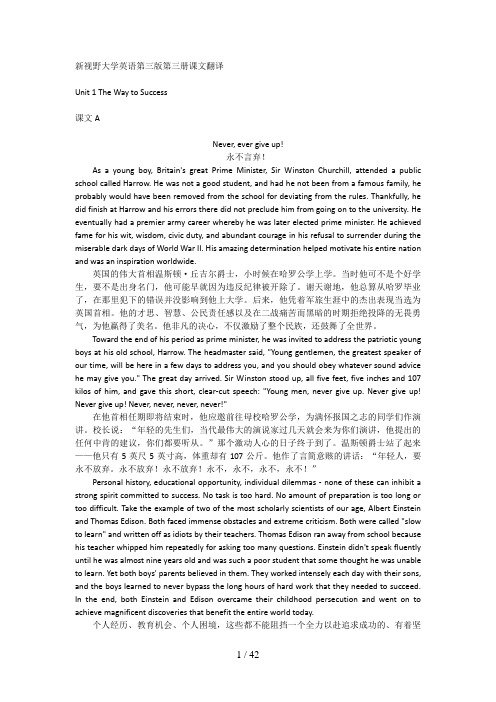
新视野大学英语第三版第三册课文翻译Unit 1 The Way to Success课文ANever, ever give up!永不言弃!As a young boy, Britain's great Prime Minister, Sir Winston Churchill, attended a public school called Harrow. He was not a good student, and had he not been from a famous family, he probably would have been removed from the school for deviating from the rules. Thankfully, he did finish at Harrow and his errors there did not preclude him from going on to the university. He eventually had a premier army career whereby he was later elected prime minister. He achieved fame for his wit, wisdom, civic duty, and abundant courage in his refusal to surrender during the miserable dark days of World War II. His amazing determination helped motivate his entire nation and was an inspiration worldwide.英国的伟大首相温斯顿·丘吉尔爵士,小时候在哈罗公学上学。
当时他可不是个好学生,要不是出身名门,他可能早就因为违反纪律被开除了。
新视野大学英语第三版第三册课文翻译修正版
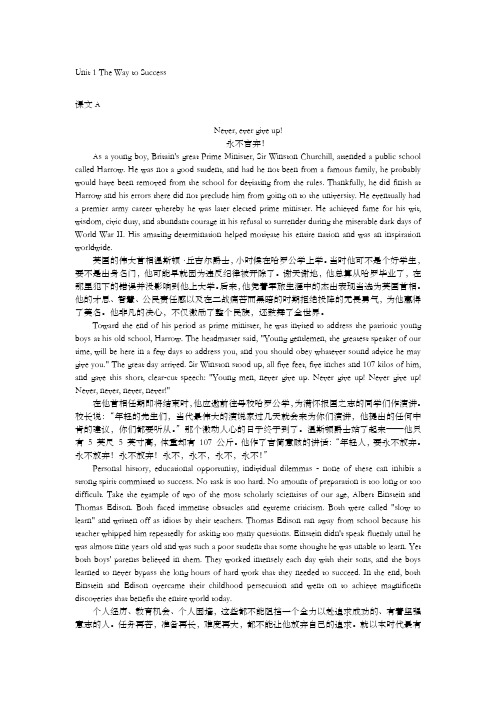
Unit 1 The Way to Success课文ANever, ever give up!永不言弃!As a young boy, Britain's great Prime Minister, Sir Winston Churchill, attended a public school called Harrow. He was not a good student, and had he not been from a famous family, he probably would have been removed from the school for deviating from the rules. Thankfully, he did finish at Harrow and his errors there did not preclude him from going on to the university. He eventually had a premier army career whereby he was later elected prime minister. He achieved fame for his wit, wisdom, civic duty, and abundant courage in his refusal to surrender during the miserable dark days of World War II. His amazing determination helped motivate his entire nation and was an inspiration worldwide.英国的伟大首相温斯顿·丘吉尔爵士,小时候在哈罗公学上学。
当时他可不是个好学生,要不是出身名门,他可能早就因为违反纪律被开除了。
新视野大学英语第三册_课文原文

新视野大学英语第三册_课文原文1 Just as my father’s death had changed Jimmy’s world overnight, September 11th changed our lives; the world we’d known was gone. But, as we sang for Jimmy and held each tight afterward praying for peace around the world, we were reminded that the constant love and support of our friends and family would get us through whatever life might present. The simplicity with which Jimmy had reconciled everything for us should not have been surprising. There had never been limitations to what Jimmy’s love could accomplish.2 Iron deficiency is very common among women in general, affecting one in four female teenagers and one in five women aged 18 to 45, respectively. But the ratio is even greater among active women, affecting up to 80 percent of female endurance athletes. This means, Lyle says, that "too many women ignore the amount of iron they take in";. Women of child-bearing age are at greatest risk, since their monthly bleeding is a major source of iron loss. Plus, many health-conscious women increase their risk by rejecting red meat, which contains the most easily absorbed form of iron. And because women often restrict their diet in an effort to control weight, they may not consume enough iron-rich food, and are liable to experience a deficiency. "The average woman takes in only two thirds of the recommended daily allowance for iron," notes another expert. "For a woman who already has a poor iron status, any additional iron loss from exercise may be enough to tip her over the edge into a more serious deficiency,"4 In the mid-1870s, French artist Frederic Auguste Bartholdi was working on an enormous project called Liberty Enlighteningthe World, a monument celebrating US independence and the France-America alliance. At the same time, he was in love with a woman whom he had met in Canada. His mother could not approve of her son's affection for a woman she had never met, but Bartholdi went ahead and married his love in 1876.That same year Bartholdi had assembled the statue's right arm and torch, and displayed them in Philadelphia. It is said that he had used his wife's arm as the model, but felt her face was too beautiful for the statue. He needed someone whose face represented suffering yet strength, someone more severe than beautiful. He chose his mother.6 Although scientists still cannot predict earthquakes, they are learning a great deal about how the large plates in the earth's crust move, the stresses between plates, how earthquakes work, and the general probability that a given place will have an earthquake. Someday soon it may actually become possible to predict earthquakes with accuracy. However, even if prediction becomes possible, people who live in areas where earthquakes are a common occurrence will still have to do their best to prevent disasters by building structures that are resistant to ground movement and by being personally prepared. These precautions can make a great difference in saving lives and preventing the loss of homes. Education concerning how to survive an earthquake should be a major emphasis for all government programs and earthquake-related research projects.7 He’s the most famous businessman and the richest man in the world---worth an estimated $40 billion in 1997. Without a doubt, Bill Gates belongs in the same class as Tomas Edison, Alexander Graham Bell, and other great minds who changed the world. The self-described ”hacker” has dominated the personalcomputing revolution and modernized the whole world in the process. Indeed, his classification into any other rank than this would seriously understate his impact on the world.9 Romantic love has no bearing on this process, say these lawyers, who consider prenups to be business agreements. Their justification: Some 50 percent of all marriages in the United States end up on the trash heap.Moreover, the discussions for a prenuptial agreement, which involve laying bare all one's finances, sometimes save a couple from a terrible marriage." It sheds light on issues which could later widen and result in divorce," said a lawyer.10 We looked at each other with identical expressions. Then it probably dawned on us both that the place in which we sat is not the place of men who have been failures in life , and that for boys , being what they are , an occasional push is not such a bad thing. Together we lifted our glasses, and the tensions between us went away. And though neither of us spoke, I know we drank to the memory of our Aunt Carrie.1 Parents are the most influential (lack reckon revolve accomplished preserve reconcile admitted wreck agreeable blossom)2 Sad to say, the link between (physical suffer refreshed victim gravity exercise invite deficiency endurance poor)4 The White House and the (Descriptive cultures residents president similarly reflects ancestors purpose witness self-seclusion )5 Henry Thoreau was a 19th century writer (Freedom impressed effects addition interfere actually convenience surrounding observing detailed)6 During an earthquake, (stay driving avoiding aftershocksdisasters inhabitants occur motions released seismic)7 If you were on a (collective accomplish displaying comprised abuses restraint outcomes maximum headquarters concentrating)9 I have a prenuptial agreemet (violate inherited justification committed effective verify contest bearing consented stung)10 You're sitting on the train (opppsite yawning phenomenon tend discovery humans experiment spread exchange responses)。
新视野大学英语第三版读写教程Book1-Unit1-sectionB课文及翻译

Unit1What we wish我们的期望My dear child,我亲爱的孩子:You are about to participate in the next leg of yourjourney through life. For us, this part is bittersweet.As you go off to college, exciting new worlds willop en up to you. They will inspire and challenge you; you will grow in incredibl e ways.你即将踏上人生的下一段旅程。
这让我们感到喜忧参半。
当你离家、步入大学的校门,激动人心的崭新世界将会展现在你面前。
这将带给你鼓舞,也会使你面临挑战;你将获得更大的进步与成长。
This is also a moment of sadness. Your departure to college makes it unden iably clear thatyou are no longer a child. There has been no greater joy than watching you arrive at thismoment. You have turned our greatest challenge i nto our greatest pride. Although we havebrought you to this point, it is hard to watch you depart. Remember above all things, we willmiss you.这也是令人伤感的时刻。
离家去上大学就明确意味着你不再是个孩子了。
没有什么比看到你走到今天这一步更令我们欣喜的了。
你曾经是我们最大的挑战,现在却成为我们最大的骄傲。
新视野大学英语读写教程第三册含sectionB
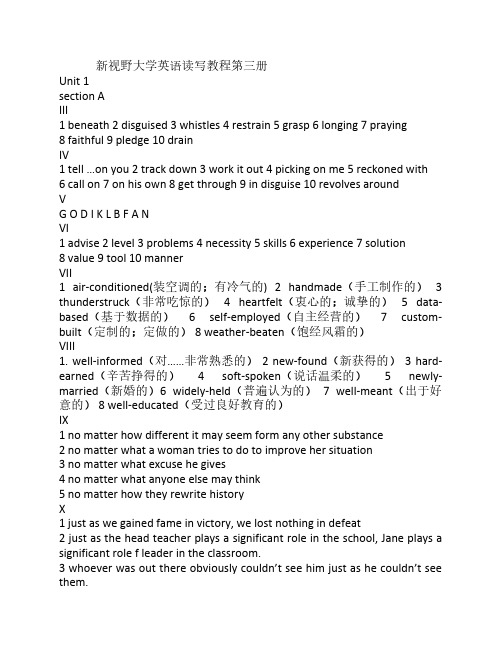
新视野大学英语读写教程第三册Unit 1section AIII1 beneath2 disguised3 whistles4 restrain5 grasp6 longing7 praying8 faithful 9 pledge 10 drainIV1 tell …on you2 track down3 work it out4 picking on me5 reckoned with6 call on7 on his own8 get through9 in disguise 10 revolves aroundVG O D I K L B F A NVI1 advise2 level3 problems4 necessity5 skills6 experience7 solution8 value 9 tool 10 mannerVII1 air-conditioned(装空调的;有冷气的)2 handmade(手工制作的)3 thunderstruck(非常吃惊的)4 heartfelt(衷心的;诚挚的)5 data-based(基于数据的)6 self-employed(自主经营的)7 custom-built(定制的;定做的)8 weather-beaten(饱经风霜的)VIII1. well-informed(对……非常熟悉的) 2 new-found(新获得的) 3 hard-earned(辛苦挣得的) 4 soft-spoken(说话温柔的) 5 newly-married(新婚的)6 widely-held(普遍认为的)7 well-meant(出于好意的) 8 well-educated(受过良好教育的)IX1 no matter how different it may seem form any other substance2 no matter what a woman tries to do to improve her situation3 no matter what excuse he gives4 no matter what anyone else may think5 no matter how they rewrite historyX1 just as we gained fame in victory, we lost nothing in defeat2 just as the head teacher plays a significant role in the school, Jane plays a significant role f leader in the classroom.3 whoever was out there obviously couldn’t see him just as he couldn’t see them.4 she has been searching all her life for the perfect chocolate just as I have been searching for the perfect beer.5 you can make those kinds of comparisons just as you were doing the analyses a minute ago.XI1. No matter how experienced a speaker you are, and how well you have prepared your speech, you will have difficulty making a speech at such a noisy reception.2. Just as all his sister’s friends cared about him, Jimmy cared about them.3. Car manufacturers stamp a vehicle identification number at several places on new cars to help track down stolen vehicles.4. If you dare tell on me when the teacher gets back I won’t say a word to you any more.5. Some elderly people prefer to live on their own while the great majority choose to live with their children.6. Here is something that needs to be reckoned with: how to get the necessary finances to establish the company.XII1. 每当有人帮了你,无论事情大小,无论他地位高低,你都应该对他说声“谢谢”。
新视野大学英语第三版第三册第一到第六单元课文译文

第一单元:永不言弃!1 英国的伟大首相温斯顿·丘吉尔爵士,小时候在哈罗公学上学。
当时他可不是个好学生,要不是出身名门,他可能早就因为违反纪律被开除了。
谢天谢地,他总算从哈罗毕业了,在那里犯下的错误并没影响到他上大学。
后来,他凭着军旅生涯中的杰出表现当选为英国首相。
他的才思、智慧、公民责任感以及在二战痛苦而黑暗的时期拒绝投降的无畏勇气,为他赢得了美名。
他非凡的决心,不仅激励了整个民族,还鼓舞了全世界。
2 在他首相任期即将结束时,他应邀前往母校哈罗公学,为满怀报国之志的同学们作演讲。
校长说:“年轻的先生们,当代最伟大的演说家过几天就会来为你们演讲,他提出的任何中肯的建议,你们都要听从。
”那个激动人心的日子终于到了。
温斯顿爵士站了起来——他只有5英尺5英寸高,体重却有107公斤。
他作了言简意赅的讲话:“年轻人,要永不放弃。
永不放弃!永不放弃!永不,永不,永不,永不!”3 个人经历、教育机会、个人困境,这些都不能阻挡一个全力以赴追求成功的、有着坚强意志的人。
任务再苦,准备再长,难度再大,都不能让他放弃自己的追求。
就以本时代最有学问的两位科学家——阿尔伯特·爱因斯坦和托马斯·爱迪生为例,他们都曾面临巨大的障碍和极端的批评,都曾被说成“不开窍”,被老师当成笨蛋而放弃。
托马斯·爱迪生还曾逃学,因为老师嫌他问的问题太多而经常鞭打他。
爱因斯坦一直到将近9岁才能流利地说话,学习成绩太差,有些人认为他都已经学不好了。
然而,这两个男孩的父母都相信他们。
他们坚持不懈地每天和儿子一起努力,孩子们也了解到,要想成功,就绝不要怕付出长期而艰辛的努力。
最终,爱因斯坦和爱迪生都摆脱了童年的困扰,进而作出了造福当今全世界的伟大发现。
4 再如亚伯拉罕·林肯这个英雄的典范,他一生面临了无数艰辛、失败和接二连三的不幸。
他的出身和经历真是一点也算不上光鲜。
他在一个非常贫困的家庭长大,只受过一年正规教育。
(完整版)新视野大学英语第三版读写教程Book1-Unit1-sectionB课文及翻译
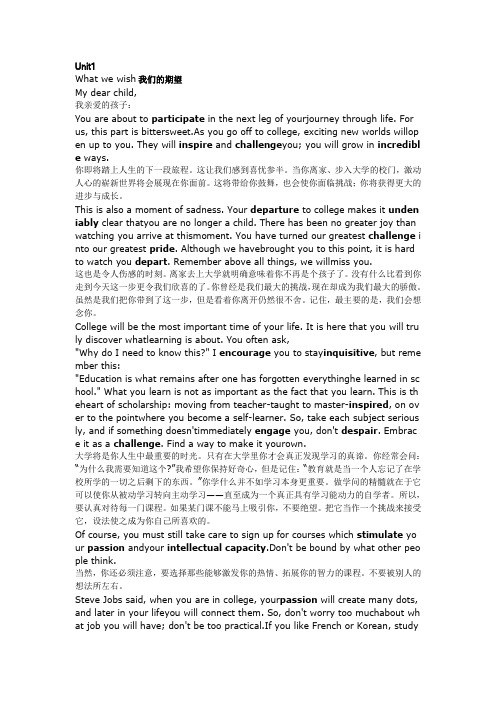
Unit1What we wish我们的期望My dear child,我亲爱的孩子:You are about to participate in the next leg of yourjourney through life. For us, this part is bittersweet.As you go off to college, exciting new worlds willop en up to you. They will inspire and challenge you; you will grow in incredibl e ways.你即将踏上人生的下一段旅程。
这让我们感到喜忧参半。
当你离家、步入大学的校门,激动人心的崭新世界将会展现在你面前。
这将带给你鼓舞,也会使你面临挑战;你将获得更大的进步与成长。
This is also a moment of sadness. Your departure to college makes it unden iably clear thatyou are no longer a child. There has been no greater joy than watching you arrive at thismoment. You have turned our greatest challenge i nto our greatest pride. Although we havebrought you to this point, it is hard to watch you depart. Remember above all things, we willmiss you.这也是令人伤感的时刻。
离家去上大学就明确意味着你不再是个孩子了。
没有什么比看到你走到今天这一步更令我们欣喜的了。
你曾经是我们最大的挑战,现在却成为我们最大的骄傲。
新视野大学英语第三版1课文1-6中英文对照
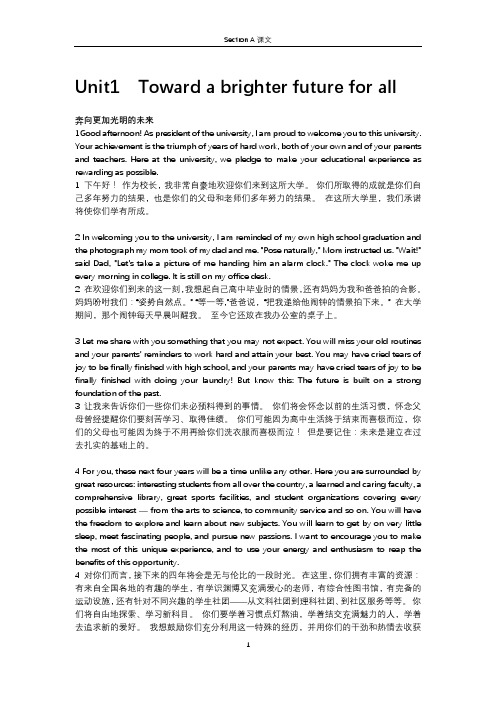
Unit1Toward a brighter future for all奔向更加光明的未来1Good afternoon! As president of the university, I am proud to welcome you to this university. Your achievement is the triumph of years of hard work, both of your own and of your parents and teachers. Here at the university, we pledge to make your educational experience as rewarding as possible.1 下午好!作为校长,我非常自豪地欢迎你们来到这所大学。
你们所取得的成就是你们自己多年努力的结果,也是你们的父母和老师们多年努力的结果。
在这所大学里,我们承诺将使你们学有所成。
2 In welcoming you to the university, I am reminded of my own high school graduation and the photograph my mom took of my dad and me. "Pose naturally," Mom instructed us. "Wait!" said Dad, "Let's take a picture of me handing him an alarm clock." The clock woke me up every morning in college. It is still on my office desk.2 在欢迎你们到来的这一刻,我想起自己高中毕业时的情景,还有妈妈为我和爸爸拍的合影。
新视野大学英语【第三版】读写教程第三册课文原文及翻译
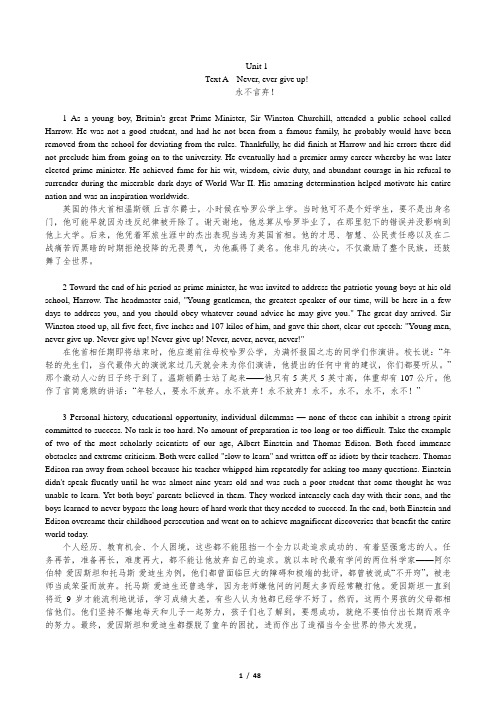
Unit 1Text A Never, ever give up!永不言弃!1 As a young boy, Britain's great Prime Minister, Sir Winston Churchill, attended a public school called Harrow. He was not a good student, and had he not been from a famous family, he probably would have been removed from the school for deviating from the rules. Thankfully, he did finish at Harrow and his errors there did not preclude him from going on to the university. He eventually had a premier army career whereby he was later elected prime minister. He achieved fame for his wit, wisdom, civic duty, and abundant courage in his refusal to surrender during the miserable dark days of World War II. His amazing determination helped motivate his entire nation and was an inspiration worldwide.英国的伟大首相温斯顿·丘吉尔爵士,小时候在哈罗公学上学。
当时他可不是个好学生,要不是出身名门,他可能早就因为违反纪律被开除了。
谢天谢地,他总算从哈罗毕业了,在那里犯下的错误并没影响到他上大学。
新视野大学英语【第三版】读写教程第三册课文原文及翻译

Unit 1Text A Never, ever give up!永不言弃!1 As a young boy, Britain's great Prime Minister, Sir Winston Churchill, attended a public school called Harrow. He was not a good student, and had he not been from a famous family, he probably would have been removed from the school for deviating from the rules. Thankfully, he did finish at Harrow and his errors there did not preclude him from going on to the university. He eventually had a premier army career whereby he was later elected prime minister. He achieved fame for his wit, wisdom, civic duty, and abundant courage in his refusal to surrender during the miserable dark days of World War II. His amazing determination helped motivate his entire nation and was an inspiration worldwide.英国的伟大首相温斯顿·丘吉尔爵士,小时候在哈罗公学上学。
当时他可不是个好学生,要不是出身名门,他可能早就因为违反纪律被开除了。
谢天谢地,他总算从哈罗毕业了,在那里犯下的错误并没影响到他上大学。
新视野大学英语第三册_unit1_SectionB

3
1
Active Expressions Focus Study
3
1
I. Active Expressions
Find out the active expressions:
1. He was not much of a pianist, but he knew the love of song and family. (L6) 2. Finally, a poor singer and so usually a violinist instead, I added my voice for a line or two. (L9) 3. … but this love is comparable to the beginning of a long road up a mountain … (L19) 4. We can truly send the spirits of those we love as well as our own soaring upwards. (L66)
time Three elements the ability to let go words to make it real
3
1
(Para.1Part I (Para.1-2)
Introduction:
autumn I often recall that cold _______ night in my hometown vacationing when my family was __________. Not much of a piano pianist, my father played the ______ with one finger, sing and the family joined him to _____. It was not until many years later did I learn that the love in our family happen framework didn’t just _______. There is a __________ people
- 1、下载文档前请自行甄别文档内容的完整性,平台不提供额外的编辑、内容补充、找答案等附加服务。
- 2、"仅部分预览"的文档,不可在线预览部分如存在完整性等问题,可反馈申请退款(可完整预览的文档不适用该条件!)。
- 3、如文档侵犯您的权益,请联系客服反馈,我们会尽快为您处理(人工客服工作时间:9:00-18:30)。
第一单元bIt was an autumn night in my native Nova Scotia.A light rain was falling, making tapping sounds on the tin roof and the smell of mouldfilled the old lodgewe were vacationing in for the weekend.A shiverin the air inspireda fire on the Franklin stove.We were all sippinghot chocolate and then my father went over to the uprightpiano, pushed up the sleeves of his shirt and began picking out a tune with one finger. He was not much of a pianist, but he knew the love of song and family.My mother put down her sewing and joined him on the bench and then my brother drifted to the piano as well.Finally, a poor singer and so usually a violinist instead, I added my voice for a line or two.My father, ever considerate, said, "See, you can sing, darling. That was good."I have often remembered how warm, happy and loved I felt growing up.It took me years, though, to learn that the love in our family didn't just happen. In fact, love never just happens—not even to people who seem as naturally loving as my mother and father.But, I would hedgeto bet, there is a framework you must live within to let this gift that has no rivalsmature.First, love needs time.Perhaps people can recognize in a moment the possibility for love, and make grand declarationssuch as "I love you" within weeks of having met, but this love is comparableto the beginning of a long road up a mountain with many ups and downs. Mature love is like a living organism.It parallelsthe life of an oak tree, growing slowly from a seed in the mudto a slendertrunkwith barely any leaves and finally into its sheltering glory.We cannot manipulateor speed up the amount of years it needs to grow, but must instead, with witand patience, appreciate one another's differences and share one another's joys and pains over time.So it is sad when divorces are caused by small provocations, when parents and children give up on one another, when friendships fall apart at the first injury, when we give up on love.Too often we say "farewell" to someone we have loved without due thought and end up paying an emotional toll that is quite costly.I once knew a father and son who, saddledwith their respectivetroubles in life, had drawn so far apart over the years that they found little to say to each other. And, without each other, their lives had become hollow.The son, just out of college, had planned to spend the summer traveling in an old yellow lorryon the two-lane highways that connected the country together before freeways.One day, when he was nearly ready to leave, he spotted his father approaching on a busy street and was struck by a singular loneliness in that long familiar face. He invited him to stop for a beer.Then on impulse, he said, "Dad, come along. Let's spend a summer together."At great risk to the family business, the father, a furniture salesman, went along with his son.Together they camped, climbed mountains, sat by the sea and explored city streets and sleepy villages."I learned more about being a father in the last two months than in all my son's years," the father told me shortlyafter their trip.Everyone's life should have room for loves worth risking sizablepieces of time we think we can't spare.We should not misleadourselves into thinking that the ones we love must be like us. The key is to recognize and appreciate our differences.Those differences provide the mystery and wonder of human relationships.Love needs another, harder-to-find quality as well, the ability to let go.In the early years of my marriage, I had faultynotions that my husband should want to be with me all the time.On our first visit to his family's house, I discovered that the men did things together and the women did the same.My father-in-law stole my place next to my husband in the front seat of the car, and the two of them often went out together, leaving me with the women.I complained and made my husband miserable, caught as he was between the people he loved.My mother-in-law said wisely, "Being with his father is one part of his life; being with you is another. Be happy about both of them."I learned that love is like an elasticbandthat must stretchapart before it pulls you back close to one another.It is a coming tidewhose waters retreat a little after a single wave, but the next one is closer to your heart than the one before.Finally, love needs words to make it real.Without words, quarrels can't be resolved and we lose the power to share the meaning of our lives.The important thing is to acknowledgeand express our feelings.In this way, we can truly send the spirits of those we love as well as our own soaringupwards.Love is not a single act, but a lifetime adventure in which we are always learning, discovering, growing.It is neither destroyed by a single failure nor won by a single kiss.It can only be achieved through patience and understanding.第二单元bJust as exercise strengthensthe heart and lungs, bones and muscles, it may also power up the brain.A successionof scientific studies of animals impliesthat physical activity has a positive effect on mental functioning."It's clear that the brain benefits from exercise," says brain scientist William Greenough of the University of Illinois at Urbana-Champaign.His studies with rats have demonstrated two primaryeffects of activity: Vigorousphysical exercise provides the brain with more fuel, and skill-based exercise increases the formationof connections in the brain, which, according to the proposalsof some scientists, may make the brain better able to process information.In one experiment, laboratoryrats were separated into three groups.One group was exercised by running inside an automatic wheel, a second group improved their skills in a complicatedobstaclecourse, and a third group was inactive. "The animals that learned to go through the obstacle course exhibiteda greater number of brain connections than the animals in the exercised or inactive groups," Greenough said."In contrast, the animals that exercised inside the automatic wheel possesseda greater densityof blood vessels in the brain than did either of the other two groups of animals."Learning a new dance step may boostthe brain in the same way that learning a language can, he says.And if the dance is a good physical exercise as well, the benefits multiply. Young brains may be especially able to boost brain power through exercise, suggested another of Greenough's experiments that showed the most significant changes in the brain occurred among rats that had been exercised when very young.And while animals aren't people, he says it is logicalto make the inferencethat an effect found in rats may also apply to humans.Human studies have focused primarilyon older adults and suggest that regular exercise can improve the speed with which the brain processes information. Measurementsmade by Arthur Kramer at the University of Illinois demonstrated that inactive adults, aged to , could hit buttons faster in response to a tone after they went through a -week water exercise course.A correspondingcontrol group that didn't exercise showed no improvement.This boost in reaction time after exercise training may occur because declines associated with getting old could actually stemfrom declines in physical condition. Some scientists speculatethe reductionin mental function often attributed to getting old may really be a penaltyof neglecting to stay physically active, in addition to related factors such as medicines and poor diet."In older people, an exercise program appears important for brain maintenance," says Daniel M. Landers, professor of exercise science at Arizona State University, who recently published an article reviewing the scientific literature on activity's effect on the brain.Numerous studies show that children who engage in regular physical activity do better in school than their inactive classmates.But until recently, the academicedge gained by participating in sports was thought to come from the increased self-confidence, the better mood, and the ability to concentratethat comes from burning off steam in exercise.Now, however, some scientists have revisedtheir way of thinking, and point to possible physical connections.Pierce J. Howard, another expert, says new research indicates that physical exercise increases the amount of certain brain chemicals that stimulate growth of nerve cells. Consequently, the brains of people who exercise may be better equippedto tacklemental challenges.Inactivitymay also have negative effects on mind and body alike."Scientists recognize that mind is body, and body is mind," comments Howard. The most beneficialforms of exercise, he says, engage both.第三单元bTo talk about problem-solving or decision-making within a national environment means examining many complexcultural forces.It means trying to measure the impact of these forces on contemporary life, and also coming to gripswith changes now taking place.In Japan, the most important thing is what organization you work for.This is of extremeimportance when trying to analyzethe direction-taking or decision-making process.At the least, it explains the greater job stabilityin Japan, in contrast to the great job mobilityin America.While we differin many ways, such differences are neither superiornor inferiorto each other.A particular pattern of managementbehavior develops from a complex mixture of unique cultural factors—and will only work within a given culture.Let me try to describe three or four characteristics of the Japanese environment that in some way affect decision-making and problem-solving.These characteristics are related to each other.First, in any approach to a problem and in any negotiationsin Japan, there is the "you to you" approach, as distinguished from the Western "I to you" approach. The difference is this: In "I to you", both sides present their arguments openly from their own point of view—they state what they want and what they expect to get.A confrontation situation is therebyset up, and Westerners are very skillful in dealing with this.The "you to you" approach practiced in Japan is based on each side—automatically and often unconsciously—trying to understand the other person's point of view. Thus, the direction of the meeting is a mutual attempt to reduce confrontation and achieve harmony.A second characteristic is based on "consensusopinion" and "bottom-updirection". In Japan great considerationis given to the thoughts and opinions of everyone at all levels.This is true of both private enterprisesand government ministries.In Japan there is a drive for unitywithin the group—whether it is family, company, or Parliament.The difference is that Western-style decision-making proceeds mostly from top management and often does not consultmiddle management or the worker while in Japan, ideas can be created at the lowest levels, travel upward through an organization and have an impact on the eventual decision.This is "bottom up".There is also a characteristic style of communication in Japan that is different from the Western way.The Japanese business person works to achieve harmony, even if the deal falls through, and will spend whatever time is necessary to determine a "you to you" approach, communicating personal views only indirectly and delicately.This places time in a different perspective.In Japan the Western deadline approach is secondary to a thorough job.Owingto this difference in emphasis, the Japanese are thorough in their meetings as well as in their production.Thus Americans are often frustrated by the many successivemeetings in many Japanese businesses.But where the American is pressing for a specific decision, the Japanese is trying to devise a rather broad direction.On the other hand, once a given agreement is made, it is the Japanese who sometimes wonder at the slow pace in which Westerners implement the decision.The Japanese are eager to move forward and Westerners, perhaps, lagbehind as they take the time for in-depthplanning.Now, while Japan's industry and technology are highly developed, they have not replaced the fundamentalforce of human energy and motivation.By that I mean that the Japanese take great pride in doing a job well and getting it done no matter how much time is required.There is a commitment and sense of responsibility, which have not yet been discardedin this age of machines.In my field—finance and securities—I am often asked by Westerners how Nomura Securities has managed to escape the paper traffic jam that American firms have faced.We, too, have had that problem.The Tokyo Stock Exchange often has between and million transactionsa day.This volumeis many times more than that of the New York Stock Exchange.How can it be feasibleto handle this load?First, we have very sophisticatedcomputers.Second, and most important, the operationalpersonnel responsible for processing all these transactions stay and stay until the job is done.Perhaps in years—or sooner—they will be more westernized and insist on going home at five o'clock.But today, still, most insist on staying until the job is done.There is a sincere concern for quality.This willingness to help in a pinchis an important aspectof Japanese problem-solving, and you find it at every level.Some years ago, the Matsushita Company was having a very bad time.Among the many measures taken, Mr. Matsushita, the founder and then chairman, became the manager of the sales department.Also, when we at Nomura convertedto computers about five years ago, the new systemeliminated the jobs of people.We did not dismissthese people; rather, we converted them to securities sales people and some of these are now our leading sales people.Providedthere is intelligence and a willingness to exertyourself, there is a place within the company to try and to succeed.In Japan, a person's capabilities are not forced into an inflexiblearea.And we feel the company owesa worker something for loyaltyand commitment.第四单元bMary Engelbreit was a talented but struggling artist in her mid-twenties when she flew to New York from her native Saint Louis, hoping to find work illustrating children's books—her life's goal.So she was disappointed when all the book publishers she visited turned her down. One even suggested her drawings might be better suited to greeting cards."I was crushed," Engelbreit admits.Greeting cards seemed a comedownfrom her high expectations, but the advice stayed with her, and she decided to give it a try.The results transformed her life forever.Today Mary Engelbreit sells an astonishing million greeting cards a year.Her popular designs appear on more than , products, including books, calendars, and kitchen items.She runs a retailcompany with shops in nine cities ( more are planned), and her products are carried by , retailers.Annualretail sales are in the $ million range—all as a result of that fateful, disappointing trip to New York.It's probably no accident that one of Engelbreit's boldercards shows a young girl in overalls, her barefeet up on a desk, a farm field in the window behind her. "We Don't Care How They Do It in New York," the card boasts.Once you know Engelbreit's distinctivestyle, you can recognize her cards from paces away—bright, funny, and with an eye to the past.Her cards usually have elaborateborderdesigns comprisedof repeated images: hearts, flowers, peaches, and teapots, for example.Most often, there's Ann Estelle, a woman with short, straight hair, big glasses, hat and an acidtongue.Ann Estelle (named after her grandmother) is the imaginaryrepresentative of Mary's outlook.Engelbreit is cheerful, down-to-earth, humorous, and always cute."I think the world could use more cuteness," she explains.Indeed, it's her trademark.Her business card once featureda drawing of Ann Estelle, cigarin her mouth and drink in hand, with the message "Engelbreit's the Name, Cute Is My Game."She adds, "As the world gets more complicated, it's nice to have old-fashionedstuff around to help people cope with the demands of modern life.It's like comfort food.This is comfort art."Old-fashioned art—and values—have always been at the core of Engelbreit's life. Born June , , in St. Louis, the oldest of three daughters, she started drawing almost as soon as she could hold a pencil.One of her earliest memories, from age four, is of sketching her parents all dressed up to go out for the evening."I was so impressed I had to record it," she says.But what impressed her most were illustrationsfrom the children's books that her mother read to her.Artists such as Jessie Willcox Smith, illustrator of children's literaryclassics, and Johnny Gruelle, creator of Raggedy Ann, were very influentialin the development of her early drawings.While attending secondary school, Engelbreit sold dozens of hand-drawn cards to a local shop for cents a piece—her first ventureinto art and commerce.She ignored her teachers' advice to become an English teacher and didn't bother with going on to a university because "I was ready to plungeinto my life as an artist." Working in an art-supply shop, "I met working artists and realized you can make a living doing this."A later job as a designer at an advertising agency "taught me about the business of art".In Engelbreit met social worker Phil Delano, and the couple married two years later. Delano became his wife's biggest supporter."Even when we had no money, he never said, 'Go get a job,'" she says."I can't express my gratitude for his support."After that ill-fatedtrip to New York, Engelbreit sent a sampleof her drawings to two greeting card companies.One bought three of her original drawings, and she did occasional work for the other, sketching a lot of whales, dragons, castles and mythicalanimals.Then in the birth of her son added a new element to her work."Suddenly everyday life seemed more interesting to me," she says.Children, pets, even "good old Mom" started showing up on her cards.Her work became "pictures of daily life, things everyone's been through".While eight months pregnant, in , Engelbreit decided to start her own company. Within two years, her company was producing nearly different cards and selling a million of them a year.In she licensedthe copyrightsto the cards to SunrisePublications, who now manages their production and distribution, allowing her to focus on other projects. Among these is her home-decoratingmagazine which is sent to , people.Despite her success, Engelbreit's feet are planted firmly on the ground.She still lives kilometres from where she grew up, has many friends dating back to school years, and moved from a large house to a smaller one because, she explains, her family didn't use all the space in the old place.She does most of her drawing in her home studioat night.With her work taking off in so many directions, it was perhaps inevitable that Engelbreit would eventually realize her dream of illustrating a children's book.In she created drawings for a children's book and saw it become a best-seller. At the same time she made a surprising discovery: "It was fun, but oddly enough, I like doing cards best."第五单元bAssume for a moment that your -year-old mother has recently suffered a stroke. She is right-handed, and now she is unable to move her right arm and leg—they are worthlessto her.She can make sounds, but she can't make herself understood.The condition has lasted two months and since there has been no sign of improvement, the doctor tells you she will never get significantly better.Until this time your mother has always been an active, independent person who lived on her own.Now she is completely dependenton others.Next, X-raysshow your mother has a lung infection—a frequent problem with stroke patients.The doctor then calls you, her only surviving relative."We can treat the infection with drugs and she'll probably get better in a week," he says."When I say better, I mean she'll go on as she has—until some other germcomes along. Or I can deny her the medicine, in which case she'll probably die in three or four days.We can make those days comfortable by giving her painkillersand sleeping pills. Which course do you want me to follow? "Tough question, isn't it?On the one hand, you cannot bear to see your once vigorous mother living the painful, limited life to which the stroke has condemned her.On the other hand, you hate to be the one to decide to let nature take its course. I'll tell you which choice I would make in this theoreticalsituation.I'd say, "Don't give her anything to fight the infection.Keep her comfortable and let's see what happens; maybe she'll fight off the infection on her own and if she doesn't, she'll die a peaceful death.I don't want to be responsible for condemning my mother to a living hell."I can make this decision because I've gone down this road with patients many times. Recently I operated in vainon an eighty-year-old woman with cancer of the liver. There was nothing I could do to relievethe problems the cancer had caused. She was an intelligent woman, without any close relatives, and a couple of days after the operation I sat down with her and explained the situation."I can give you some anti-cancerdrugs," I said,"but they will make you sick and cannot cure you.Similarly, I can give you fluids through a needle in your arm, which will keep you fed as your appetiteslips away; the fluids might add a week or two to your life. Or I can withdrawall other treatment and just give you a vitamin pill, and we can see what happens. Personally, my recommendationwould be the last choice. I'll keep you comfortable, and we'll see what happens."The patient electedto follow my advice and died peacefully, pain free, a fortnightlater.Sometimes such a transparentdecision is more difficult to come by.Recently I had a patient who suffered a severe stroke.He was completely unable to move and couldn't swallow anything.We gave him fluids for the first two weeks and then fed him through a tubewhich passed through his nose into his stomach.After three weeks he was still completely unconscious, and the tube caused him to have a constant, painful sore throat.I talked to his four grown children and told them I thought we should inserta tube directlyinto his stomach through a small hole so he could be fed without so much pain.I also told them, "I can remove the tube and just let him swallow whatever he can. Chances are he won't live long, but he won't be in pain."No one wanted to take the responsibility for permitting an operation, yet no one would give permissionto stop feeding the patient entirely.As a result, the poor man continued on for nearly three more months with a painful throat and frequent bleeding caused by sores in the mouth.He died of a major infection—a sad way to die.So what should responsible persons do when confronted with the necessityof such an enormous decision?What it all comes down to is common sense.For the years I have been a doctor, and for hundreds of years before that, doctors and families have been quietly cooperatingto decide what is best for a patient in the final phaseof an illness.In percent of the cases a sympathetic, reasonable decision can be made after appropriate discussion.In percent of cases where such a judgment cannot immediately be reached, the proper decision will become apparent after a few days or weeks of basic treatment, observing the patient's progress.Let me sound one note of warning.Neither families nor doctors like to make life-death decisions.>But there is no question that if either party insists on bringing in aso-called"neutral" third party (usually some representative of the state or legalprofession), not only will the process take longer, in many instances it will be more arbitraryand less sympathetic.What we are trying to avoid is neutrality; the only people with any qualificationto decide are those who know the patient intimatelyand can put his or her interests first.If there's one place from which the interferenceof lawyers and government officials should be barred, it's from the rooms of critically ill patients.第六单元bPerceptions are relative.A single tree may seem large compared to a person.If you compare it to a mountain, however, the large tree seems small.In other words, things in nature are large or small, new or old, only in accordancewith the measures and the comparisons involved.During the durationof one human lifetime, not many things change.Even trees live longer than people, and the Earth itself is far older.The Earth was formed about five billion years ago from a rotating, circularcloud of dust and gases such as hydrogenand nitrogen.A billion years later, the planet had cooled, and the continents and the great bodies of water had formed.About . billion years ago, another great change occurred.The oceans began to develop an enormous system of living things, with many diverse forms of life, all dependent on one another.The first animals on this living sphere, the Earth, were primitivemarine animals, and then around million years ago these sea animals developed shells.Seventy million years later, the first fish appeared.Next, insects developed, about million years ago.After another million years, dinosaursand the first mammalswalked the Earth. About million years ago, warm-bloodedanimals took to the air—the first birds. Fifty million years later, both birds and mammals were well established.About three million years ago, scientists believe, the first human beings walked the Earth.Life was now flourishing.In terms of the evolutionof life on Earth, human beings have just arrived. Despite their short time on Earth, however, people have brought about enormous changes to the surface of the planet—changes far out of proportion to the interval of time they have occupied it.<B>People Try to Control Resources</B>People have more control over their surroundings than any other specieson Earth. With the combination of intelligence and manualskill (allowing us to make and use tools), people have found ways to use plant and animal resources, mineral ores, fuels, and many other materials and resources from the Earth.As the number of people on Earth increases, it becomes increasingly difficult for the population to survive on the resources of the land.The amount of land is limited.Although agricultural production can be increased by use of machinerysuch as tractorsand the addition of fertilizer, the land ultimately can produce only so much food and no more.As the human population grows, people consume more.Clearly, some locationson Earth already have too many people; in many of these areas, future increases will surely bring about more poverty and suffering.Yet people in rich nations use proportionallyfar more of the available resources than people in poorer nations.As they consume these resources without restraint, they also waste large amounts of them.。
